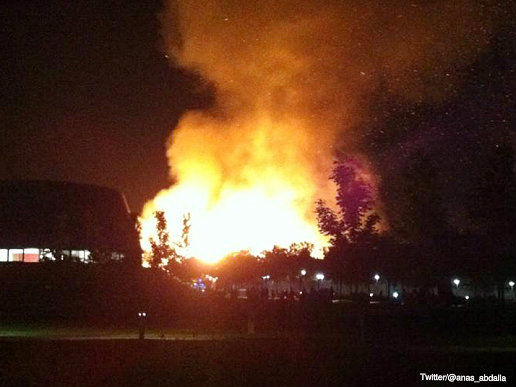
Environmental scientists at the University of Nottingham have made a shocking and expensive discovery: eco-friendly buildings made of “sustainable” wood burn much more easily than eco-unfriendly ones made of stone, concrete, steel or glass.
They made their surprise discovery over the weekend when their new Carbon Neutral Laboratory for Sustainable Chemistry burned to the ground in what local firemen claimed was the biggest blaze in over a decade.
The £15 million building had been erected according to the most rigorous environmental principles, made with a wooden frame and other “sustainable” materials, and powered with “renewable” energy, so that the structure could remain “carbon neutral” throughout its lifetime.
According to Nottingham’s registrar Dr Paul Greatrix this demonstrated the university’s “commitment to sustainability in all its forms”.
Unfortunately, the fire appears to have remained unmoved by the building’s eco-friendly credentials and razed it to the ground in much the same way one of its ancestors did to a third of the City of London in the Great Fire of 1666.
After the Great Fire – and the rebuilding of London by Sir Christopher Wren – an act was passed in 1667 making it illegal to erect buildings using wooden frames.
However, three hundred years on, environmental experts have decided they know better. Timber-framed buildings have become fashionable again because, apparently, they make a “positive contribution to tackling climate change.”
As for concerns about the fire risk, these were brushed aside in a 1999 safety report – heavily promoted by the UK Timber Frame Association – which meant that the ban dating from the Great Fire of London was relaxed.
However, it subsequently emerged that the report was flawed. A six-storey timber framed building had been set alight under controlled conditions in an aircraft hanger and then extinguished by firemen. But what the report neglected to mention was that, in the night, the fire had reignited and burned out the top four floors.
Since then there has been a spate of serious fires involving timber-framed buildings, such as the destruction in 2010 of a block of flats in Peckham, South London.
But the University of Nottingham is proving heroically determined not to learn lessons from any of this.
A university spokeswoman said: “We are considering this to be a setback to our plans. There is a determination to re-build but at this stage it is far too early to say whether this will be on the same site, how much it might cost and when we could expect to see that facility open.”

COMMENTS
Please let us know if you're having issues with commenting.